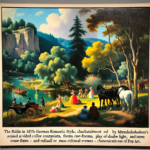Henry Purcell Overview

- Estimated Net Worth: Not applicable (historical figure)
- Age: 36 years
- Born: September 10, 1659
- Died: November 21, 1695
- Gender: Male
- Country of origin: England
- Source of wealth: Music composition, royal appointments
Early Life and Background
Henry Purcell was born on September 10, 1659, in Westminster, London, England. He was the son of Henry Purcell Sr., a gentleman of the Chapel Royal, and Elizabeth Purcell. His family had a strong musical background, which played a significant role in shaping his future career. From a young age, Purcell was exposed to the world of music, thanks to his father’s position and the musical environment of the Chapel Royal.
Purcell’s early education in music began at the Chapel Royal, where he was a chorister. He received training under the tutelage of Captain Henry Cooke and later Pelham Humfrey, both of whom were prominent musicians of their time. This early education provided Purcell with a solid foundation in music theory and composition. His talent was evident from a young age, and he quickly gained recognition for his musical abilities.
One of the early influences on Purcell’s career was his uncle, Thomas Purcell, who was also a musician and a gentleman of the Chapel Royal. Thomas played a crucial role in nurturing Henry’s talent and providing him with opportunities to develop his skills. This familial support, combined with his formal education, set the stage for Purcell’s future success as a composer.
By the time he was in his teens, Purcell had already composed several pieces of music, showcasing his prodigious talent. His early works included anthems and other religious compositions, which were well-received by the musical community. These early achievements laid the groundwork for his illustrious career in music.
Career Beginnings
Henry Purcell’s career began in earnest when he was appointed as the organist of Westminster Abbey in 1679, at the age of 20. This prestigious position marked the start of his professional journey and provided him with a platform to showcase his musical talents. As the organist, Purcell was responsible for composing and performing music for various religious ceremonies and events held at the Abbey.
In addition to his role at Westminster Abbey, Purcell also served as a composer for the Chapel Royal. This dual appointment allowed him to compose a wide range of music, including anthems, hymns, and other religious works. His compositions were highly regarded, and he quickly gained a reputation as one of the leading composers of his time.
Despite his early success, Purcell faced several challenges in the initial stages of his career. The political and social climate of England during the late 17th century was tumultuous, with frequent changes in the monarchy and government. These changes often affected the patronage and support available to musicians and composers. However, Purcell’s talent and dedication helped him navigate these challenges and continue to produce exceptional music.
Financially, Purcell’s early earnings were modest. As an organist and composer for the Chapel Royal, he received a regular salary, but it was not substantial. However, his reputation and growing body of work gradually opened up more opportunities for commissions and performances, which contributed to his income. While specific dollar amounts are not available, it is clear that Purcell’s early career laid the foundation for his future financial success.
Major Breakthroughs
One of the major breakthroughs in Henry Purcell’s career came with his appointment as the organist of the Chapel Royal in 1682. This prestigious position not only elevated his status as a composer but also provided him with greater financial stability. As the organist of the Chapel Royal, Purcell was responsible for composing music for royal ceremonies and events, which brought him significant recognition and patronage from the monarchy.
Another significant milestone in Purcell’s career was his involvement in the world of theater. In the late 1680s, he began composing music for plays and operas, which became immensely popular. His work on the semi-opera “Dido and Aeneas,” composed around 1688, is considered one of his masterpieces and remains a cornerstone of English opera. The success of “Dido and Aeneas” and other theatrical works significantly boosted Purcell’s reputation and financial standing.
Purcell’s contributions to the theater were not limited to operas. He also composed incidental music for various plays, including works by William Shakespeare. These compositions were well-received by audiences and critics alike, further cementing his position as a leading composer of his time. The financial impact of these theatrical ventures was substantial, as they provided Purcell with additional income streams and increased his overall net worth.
In addition to his work in the theater, Purcell continued to compose religious music and anthems for the Chapel Royal and Westminster Abbey. His compositions were performed at significant events, including royal weddings and coronations, which brought him further recognition and patronage. While specific dollar amounts are not available, it is evident that these major breakthroughs played a crucial role in enhancing Purcell’s financial standing and solidifying his legacy as a composer.
Diverse Investments and Ventures
While Henry Purcell’s primary source of income was his work as a composer and organist, he also engaged in various other ventures that contributed to his overall net worth. One of the key areas where Purcell diversified his income was through the publication of his music. During his lifetime, several of his compositions were published and sold, providing him with additional revenue streams.
Purcell’s published works included collections of songs, anthems, and instrumental music. These publications were well-received by the public and helped to disseminate his music beyond the confines of the royal court and theater. The sales of these publications not only increased his income but also expanded his influence as a composer. While specific figures are not available, the success of these publications played a significant role in enhancing Purcell’s financial standing.
In addition to his published works, Purcell also received commissions for composing music for various occasions. These commissions came from both the monarchy and private patrons, providing him with additional sources of income. The financial impact of these commissions varied depending on the scope and scale of the projects, but they collectively contributed to his overall net worth.
Purcell’s involvement in the theater also provided him with opportunities for financial diversification. In addition to composing music for plays and operas, he collaborated with playwrights and theater companies, which brought him further recognition and financial rewards. These diverse investments and ventures allowed Purcell to build a multifaceted career and secure his financial future.
Peak Earnings
Henry Purcell’s peak earnings occurred during the late 1680s and early 1690s, a period marked by significant achievements and high-profile projects. One of the key contributors to his peak earnings was his work in the theater. The success of “Dido and Aeneas” and other theatrical compositions brought him substantial financial rewards and elevated his status as a leading composer.
During this period, Purcell also continued to receive commissions for composing music for royal ceremonies and events. His compositions were performed at significant occasions, including the coronation of King James II in 1685 and the coronation of King William III and Queen Mary II in 1689. These high-profile events provided Purcell with substantial financial rewards and further solidified his reputation as a composer of royal music.
In addition to his work for the monarchy, Purcell’s published works continued to generate income. The sales of his collections of songs, anthems, and instrumental music provided him with a steady stream of revenue. The popularity of his published works extended beyond England, reaching audiences in other parts of Europe, which further increased his earnings.
While specific dollar amounts are not available, it is evident that Purcell’s peak earnings were driven by a combination of high-profile commissions, successful theatrical ventures, and the sales of his published works. This period of financial prosperity allowed Purcell to secure his financial future and leave a lasting legacy as one of England’s greatest composers.
Recent Financial Activities
As a historical figure who lived in the 17th century, Henry Purcell’s recent financial activities are not applicable. However, his legacy continues to have a significant impact on the world of music and beyond. Purcell’s compositions remain widely performed and studied, and his influence can be seen in the works of subsequent generations of composers.
In recent years, there has been a renewed interest in Purcell’s music, with numerous recordings and performances of his works. This resurgence in popularity has contributed to the continued dissemination of his music and has introduced his compositions to new audiences. While Purcell himself is no longer alive to benefit financially from this renewed interest, his legacy continues to thrive.
Purcell’s music has also been featured in various films, television shows, and other media, further extending his influence and reach. These modern adaptations and interpretations of his works have helped to keep his music relevant and accessible to contemporary audiences. The financial impact of these adaptations is difficult to quantify, but they contribute to the ongoing appreciation of Purcell’s contributions to music.
Overall, while Henry Purcell’s recent financial activities are not applicable, his enduring legacy and the continued popularity of his music ensure that his contributions to the world of music remain significant and impactful.
Philanthropy and Charitable Contributions
As a historical figure from the 17th century, there is limited information available about Henry Purcell’s philanthropic efforts and charitable contributions. During his lifetime, the concept of organized philanthropy as we know it today was not as prevalent. However, Purcell’s contributions to the world of music can be seen as a form of philanthropy, as his works have enriched the cultural heritage of England and the world.
Purcell’s compositions have had a lasting impact on the world of music, inspiring countless musicians and composers. His works continue to be performed and studied, contributing to the education and enrichment of future generations. In this sense, Purcell’s legacy can be seen as a form of cultural philanthropy, as his music has brought joy and inspiration to countless individuals over the centuries.
While specific details about Purcell’s charitable contributions are not available, it is worth noting that his music was often composed for religious and ceremonial purposes. His anthems, hymns, and other religious works were performed at significant events, including royal weddings and coronations, which brought people together and contributed to the cultural and spiritual life of the community.
Overall, while there is limited information about Henry Purcell’s direct philanthropic efforts, his contributions to the world of music have had a profound and lasting impact. His works continue to inspire and enrich the lives of people around the world, ensuring that his legacy endures.
Net Worth Over Time
- 1659: Born into a musical family with modest means.
- 1679: Appointed organist of Westminster Abbey, marking the start of his professional career.
- 1682: Appointed organist of the Chapel Royal, significantly boosting his financial stability.
- 1688: Composed “Dido and Aeneas,” achieving major success in the theater.
- 1695: Passed away, leaving behind a legacy of influential compositions.
Comparison with Peers
Henry Purcell’s net worth and financial journey can be compared to other prominent composers of his time, such as John Blow and Matthew Locke. Like Purcell, both Blow and Locke held prestigious positions as organists and composers for the Chapel Royal. However, Purcell’s contributions to the theater and his success with works like “Dido and Aeneas” set him apart from his peers.
John Blow, who was Purcell’s mentor and predecessor as the organist of Westminster Abbey, also enjoyed a successful career. However, Blow’s financial success was primarily derived from his work in religious music and his royal appointments. In contrast, Purcell’s involvement in the theater provided him with additional income streams and increased his overall net worth.
Matthew Locke, another contemporary of Purcell, was known for his contributions to both religious and secular music. Locke’s financial journey was similar to Purcell’s in that he held prestigious positions and received commissions for his compositions. However, Purcell’s ability to diversify his income through published works and theatrical ventures gave him a financial edge over Locke.
Overall, while Purcell’s financial journey shares similarities with his peers, his success in the theater and his diverse income streams set him apart. His ability to navigate the challenges of his time and secure high-profile commissions contributed to his lasting legacy as one of England’s greatest composers.
FAQ Regarding the Net Worth of Henry Purcell
- How did Henry Purcell accumulate his wealth?
Henry Purcell accumulated his wealth primarily through his work as an organist and composer for Westminster Abbey and the Chapel Royal. He also earned income from composing music for the theater and publishing his works.
- What were some significant financial milestones in Purcell’s career?
Significant financial milestones in Purcell’s career include his appointments as organist of Westminster Abbey in 1679 and the Chapel Royal in 1682, as well as the success of his theatrical works like “Dido and Aeneas.”
- Did Henry Purcell make any investments?
While specific details about Purcell’s investments are not available, he diversified his income through the publication of his music and commissions for various compositions.
- How did Purcell’s work in the theater impact his net worth?
Purcell’s work in the theater significantly boosted his net worth by providing additional income streams and increasing his reputation as a leading composer. The success of works like “Dido and Aeneas” contributed to his financial success.
- What is Henry Purcell’s legacy in terms of wealth and influence?
Henry Purcell’s legacy is marked by his influential compositions and contributions to the world of music. While specific financial details are not available, his works continue to be performed and studied, ensuring his lasting impact on the cultural heritage of England and the world.
Final Thoughts
Henry Purcell’s financial journey is a testament to his exceptional talent and dedication to the world of music. From his early beginnings as a chorister at the Chapel Royal to his prestigious appointments as organist of Westminster Abbey and the Chapel Royal, Purcell’s career was marked by significant achievements and financial success. His ability to diversify his income through published works and theatrical ventures set him apart from his peers and contributed to his lasting legacy.
While specific dollar amounts are not available, it is evident that Purcell’s contributions to the world of music had a profound impact on his financial standing. His works continue to be performed and studied, ensuring that his legacy endures. Purcell’s ability to navigate the challenges of his time and secure high-profile commissions highlights his exceptional talent and dedication to his craft.
Overall, Henry Purcell’s financial journey is a reflection of his remarkable contributions to the world of music. His legacy as one of England’s greatest composers continues to inspire and enrich the lives of people around the world. The enduring popularity of his works ensures that his influence will be felt for generations to come.
In conclusion, Henry Purcell’s financial journey is a testament to his exceptional talent and dedication to the world of music. His ability to navigate the challenges of his time and secure high-profile commissions highlights his remarkable contributions to the cultural heritage of England and the world. Purcell’s legacy as one of England’s greatest composers continues to inspire and enrich the lives of people around the world, ensuring that his influence will be felt for generations to come.








